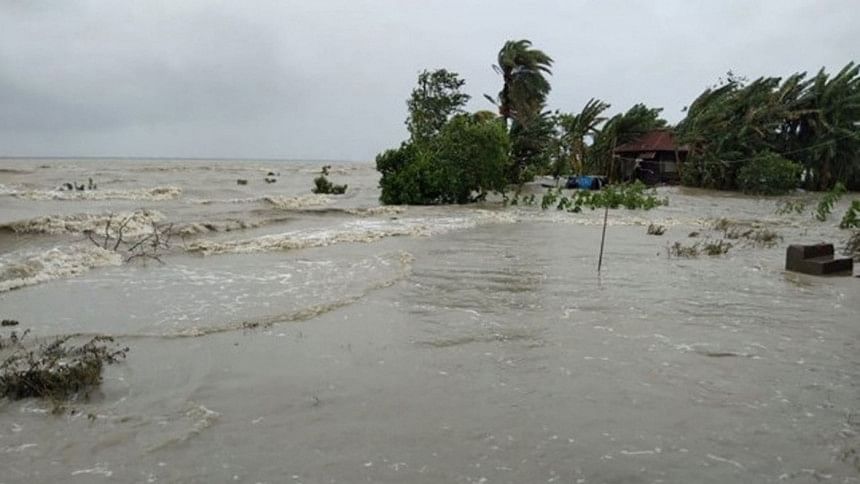A crucial decade for tackling climate change

As we welcome the new year of 2021, we also enter a new decade that will culminate with 2030, a year that marks an end point for some very important goals and milestones for the world. For one, it will mark the final year for all the countries to achieve the 17 Sustainable Development Goals (SDGs) as well as the climate change goals agreed in the Paris Agreement in 2015.
It is, therefore, an opportune moment to think forward to 2030 and imagine what we would like to achieve by that year, and then work backwards to plan on how to get there. I will focus on how Bangladesh can achieve both the SDGs and climate change goals in ten years' time.
The first point to make is that the two issues are closely related as SDG 13 is about reaching the climate change goals from the Paris Agreement as well. It is also true that the climate change goals can be reached only if the other main SDGs are met at the same time. This means, we need to take a much more integrated approach to our development pathways and investments. It's also important to note that in terms of dealing with the additional public health crisis and economic downturn caused by Covid-19, we need to adopt a much more equitable and greener investment strategy going forward.
The second point to make in terms of the climate change goals is to acknowledge that two goals deserve special attention—one being to reduce our emissions of greenhouse gases through mitigation to keep the global atmospheric temperature below 1.5 degrees Centigrade, but more importantly for Bangladesh to adapt to the adverse impacts of climate change which we will, unfortunately, have to face in the next decade. In Bangladesh—a relatively small emitter of greenhouse gases that cause global warming, but one of the countries that are most vulnerable to the adverse impacts of climate change—we need to focus much more on adaptation rather than mitigation.
In terms of what we want to achieve by 2030, we should aim to become one of the world's most resilient developing countries, rather than one of its most vulnerable, which we currently are.
In my view, this shift will require a massive effort at raising awareness and capacity building in every sector to make us resilient to climate change within the next ten years. I believe that young girls and boys are our biggest resource in this regard, and by investing in them to make them climate change champions, we will not only help Bangladesh become more resilient but also can export that knowledge to the rest of the world which can learn from our example.
This means providing environment and climate change related education with a focus on problem solving, rather than rote learning, starting from school up to the university level. It also will require providing appropriate vocational training to young people who may not go to university but can nonetheless acquire problem-solving skills required in many different professions.
However, it is at the university and professional levels that we can secure the best short-term gains. Establishing quick training courses on tackling climate change for university students as well as professional training institutes for doctors, engineers, lawyers, planners and others will not only help Bangladesh deal with climate change; it will also be a valuable knowledge resource which we can share with other countries.
Universities can also invite students from other countries, especially those in the league of vulnerable developing countries, to learn about the intricacies of climate change. To cite one example, at the International Centre for Climate Change and Development (ICCCAD) based at the Independent University, Bangladesh (IUB), we've already provided training to several hundreds of students and professionals from over 50 countries, both developed and developing.
Many other universities in the country have also started to develop similar training courses for both local and foreign students which should be expanded quickly. The universities and research institutions in Bangladesh have already set up a platform, called Gobeshona, to share knowledge on tackling climate change in Bangladesh and other countries.
A potential opportunity for sharing knowledge on adaptation to climate change, particularly on locally led adaptation by vulnerable communities, will be the upcoming Gobeshona conference which will be held online over 24 hours extending over 7 days from January 18, 2021. This will mark the start of an annual global online event to be held every January in the coming decade, where we can share our knowledge with the world on how to tackle climate change.
If we can invest in such initiatives to build capacity over the next few years, then Bangladesh has the potential to not just build its own resilience to tackle climate change, but also to share that experience and knowledge with the rest of the world.
Dr Saleemul Huq is Director of the International Centre for Climate Change and Development at Independent University, Bangladesh (IUB).

 For all latest news, follow The Daily Star's Google News channel.
For all latest news, follow The Daily Star's Google News channel. 



Comments